Safety Blog
Procuring Lab Chemicals—A ‘Cradle to Grave’ Safety Issue
By Ken Roy
Posted on 2023-03-01
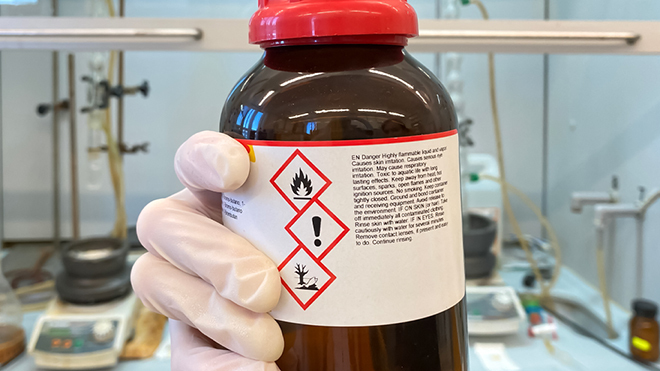
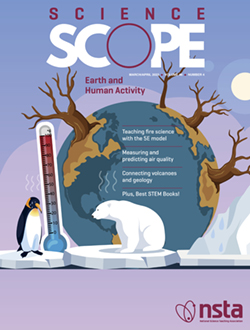
Volume 46, Number 4
March/April 2023
Earth and Human Activity
This issue of Science Scope includes articles that address the impact of humans on the Earth, overconsumption of natural resources, and how natural events—such as volcanoes—shape the decisions of local people.

Volume 46, Number 4
March/April 2023
Earth and Human Activity
This issue of Science Scope includes articles that address the impact of humans on the Earth, overconsumption of natural resources, and how natural events—such as volcanoes—shape the decisions of local people.

Volume 46, Number 4
March/April 2023
Earth and Human Activity
This issue of Science Scope includes articles that address the impact of humans on the Earth, overconsumption of natural resources, and how natural events—such as volcanoes—shape the decisions of local people.
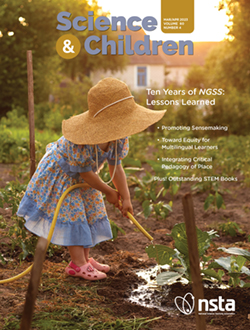
Volume 60, Number 4
Ten Years of NGSS: Lessons Learned
In the 10 years since the Next Generation Science Standards (NGSS) were released, 44 states have implemented standards influenced by A Framework for K–12 Science Education and/or the NGSS.

Volume 60, Number 4
Ten Years of NGSS: Lessons Learned
In the 10 years since the Next Generation Science Standards (NGSS) were released, 44 states have implemented standards influenced by A Framework for K–12 Science Education and/or the NGSS.

Volume 60, Number 4
Ten Years of NGSS: Lessons Learned
In the 10 years since the Next Generation Science Standards (NGSS) were released, 44 states have implemented standards influenced by A Framework for K–12 Science Education and/or the NGSS.
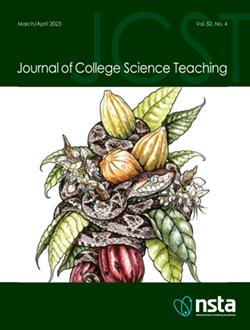
Volume 52, Number 4
March/April 2023

Volume 52, Number 4
March/April 2023

Volume 52, Number 4
March/April 2023
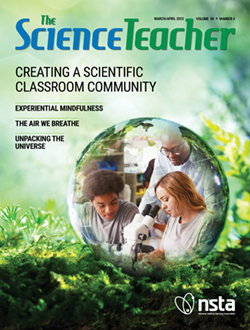
Volume 90, Number 4
March/April 2023
Creating a Scientific Classroom Community
Can we use ecology as a metaphor for the science classroom? Is there a way for students, teachers, curriculum, and learning experiences to thrive and be a community? Most definitely.

Volume 90, Number 4
March/April 2023
Creating a Scientific Classroom Community
Can we use ecology as a metaphor for the science classroom? Is there a way for students, teachers, curriculum, and learning experiences to thrive and be a community? Most definitely.

Volume 90, Number 4
March/April 2023
Creating a Scientific Classroom Community
Can we use ecology as a metaphor for the science classroom? Is there a way for students, teachers, curriculum, and learning experiences to thrive and be a community? Most definitely.
Archive: Science Update: Mission: Iconic Reefs, Bringing Science and Community Together for Coral Reefs, November 16, 2023
Lindsey Crews, Science and Outreach Coordinator for Florida Keys National Marine Sanctuary, will share information about an ambitious restoration plan, known as Mission: Iconic Reefs, that leverages cutting-edge science, innovative public-private partnerships, and community engagement to restore our degraded coral reef ecosystems within the Florida Keys.
Register to this program to discover how coral scientists use new technology and experiments to progress the world of coral restoration science and how people from all over the world can make a difference.
Lindsey Crews, Science and Outreach Coordinator for Florida Keys National Marine Sanctuary, will share information about an ambitious restoration plan, known as Mission: Iconic Reefs, that leverages cutting-edge science, innovative public-private partnerships, and community engagement to restore our degraded coral reef ecosystems within the Florida Keys.
Register to this program to discover how coral scientists use new technology and experiments to progress the world of coral restoration science and how people from all over the world can make a difference.
Lindsey Crews, Science and Outreach Coordinator for Florida Keys National Marine Sanctuary, will share information about an ambitious restoration plan, known as Mission: Iconic Reefs, that leverages cutting-edge science, innovative public-private partnerships, and community engagement to restore our degraded coral reef ecosystems within the Florida Keys.
Register to this program to discover how coral scientists use new technology and experiments to progress the world of coral restoration science and how people from all over the world can make a difference.
Lindsey Crews, Science and Outreach Coordinator for Florida Keys National Marine Sanctuary, will share information about an ambitious restoration plan, known as Mission: Iconic Reefs, that leverages cutting-edge science, innovative public-private partnerships, and community engagement to restore our degraded coral reef ecosystems within the Florida Keys.
Register to this program to discover how coral scientists use new technology and experiments to progress the world of coral restoration science and how people from all over the world can make a difference.
Nonny Edda’s Heart
By Rebecca L. Landsberg

Teacher Tip Tuesday: Preparing to Present at NSTA Conferences (All Session Types), September 12, 2023
The conference is almost here! It's time to prepare your presentation. During this web seminar, we will be outlining how to create a successful presentation at NSTA’s National Conference.
The conference is almost here! It's time to prepare your presentation. During this web seminar, we will be outlining how to create a successful presentation at NSTA’s National Conference.
The conference is almost here! It's time to prepare your presentation. During this web seminar, we will be outlining how to create a successful presentation at NSTA’s National Conference.
The conference is almost here! It's time to prepare your presentation. During this web seminar, we will be outlining how to create a successful presentation at NSTA’s National Conference.


